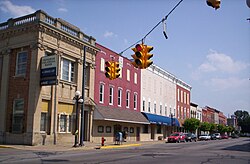Clyde, Ohio
| Clyde, Ohio | |
|---|---|
| City | |

Downtown Clyde, Ohio on South Main Street.
|
|
 Location of Clyde, Ohio |
|
 Location of Clyde in Sandusky County |
|
| Coordinates: 41°18′18″N 82°58′36″W / 41.30500°N 82.97667°WCoordinates: 41°18′18″N 82°58′36″W / 41.30500°N 82.97667°W | |
| Country | United States |
| State | Ohio |
| County | Sandusky |
| Government | |
| • Type | council-manager |
| • City manager | Paul Fiser |
| • Mayor | Scott Black |
| Area | |
| • Total | 5.09 sq mi (13.18 km2) |
| • Land | 5.04 sq mi (13.05 km2) |
| • Water | 0.05 sq mi (0.13 km2) |
| Elevation | 696 ft (212 m) |
| Population (2010) | |
| • Total | 6,325 |
| • Estimate (2012) | 6,297 |
| • Density | 1,255.0/sq mi (484.6/km2) |
| Time zone | Eastern (EST) (UTC-5) |
| • Summer (DST) | EDT (UTC-4) |
| ZIP code | 43410 |
| Area code(s) | 419 |
| FIPS code | 39-16308 |
| GNIS feature ID | 1056817 |
| Website | http://www.clydeohio.org/ |
Clyde /ˈklaɪd/ is a city in Sandusky County, Ohio, United States. The population was 6,325 at the 2010 census. The National Arbor Day Foundation has designated Clyde as a Tree City USA.
The town is known for having served as inspiration for the setting of Sherwood Anderson's 1919 collection of short stories Winesburg, Ohio.
In the 1700s, the area of Ohio including present-day Clyde was inhabited by the Wyandot tribe. The first American settlers in the area arrived in 1820.
Clyde was named after Clyde, New York.
Early in the 20th Century, Clyde joined the automobile revolution, hosting the pioneering brass era company, Elmore Manufacturing Company.
The Whirlpool Corporation purchased the Clyde Porcelain Steel Co. in 1952 and began producing washing machines there and then purchased the adjacent property of the Bendix Corporation in 1954, that produced belt-driven washing machines, making it the sole producer of washing machines in the area for the next six decades.
Clyde is located at 41°18′18″N 82°58′36″W / 41.30500°N 82.97667°W (41.304912, -82.976529).
...
Wikipedia
